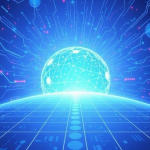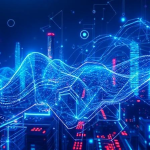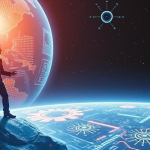New York City has long been a global hub for innovation and technology. As we step into 2025, the city continues to lead the way in advancements across multiple sectors, from artificial intelligence and fintech to smart infrastructure and sustainable energy solutions. This article explores the latest technological developments shaping New York, the impact of these innovations on its economy and citizens, and what the future holds for the city’s tech landscape.
Artificial Intelligence and Automation
Artificial Intelligence (AI) is playing an increasingly vital role in New York’s economy, driving automation across industries such as finance, healthcare, and transportation. In 2025, AI-powered chatbots and virtual assistants have become integral to customer service in banking, retail, and government offices, reducing wait times and increasing efficiency.
Machine learning algorithms are also revolutionizing industries like healthcare, where predictive analytics is enhancing early disease detection and personalized treatment plans. AI-driven robotic surgeries and telemedicine have further improved accessibility to healthcare services across the city.
Moreover, automation has reshaped the job market, with businesses integrating AI-driven systems to streamline operations. While some traditional jobs have been replaced by automation, the rise of AI has also created new roles in data science, cybersecurity, and ethical AI governance.
Smart Cities and Infrastructure
New York’s push toward becoming a smart city has reached new heights in 2025. The implementation of Internet of Things (IoT) devices across the city has improved urban management, including traffic flow, waste disposal, and energy consumption.
Smart traffic lights and AI-driven transit systems are minimizing congestion in high-traffic areas, reducing commute times and lowering carbon emissions. Sensors placed throughout the city provide real-time data that allows city officials to monitor air quality, noise levels, and water usage, leading to a more sustainable urban environment.
Additionally, smart buildings equipped with energy-efficient systems have become the norm. These buildings use AI-powered climate control, automated lighting, and renewable energy sources such as solar panels and wind turbines to reduce overall energy consumption.
Fintech Revolution
New York, home to Wall Street and some of the world’s largest financial institutions, continues to be a leader in financial technology (fintech). In 2025, blockchain technology and decentralized finance (DeFi) have become mainstream, revolutionizing how businesses and individuals manage transactions.
Cryptocurrency adoption has surged, with many businesses accepting Bitcoin, Ethereum, and other digital currencies as payment. The implementation of Central Bank Digital Currencies (CBDCs) by the Federal Reserve has also streamlined transactions, reducing costs and increasing financial inclusion.
AI-driven financial tools are helping individuals and businesses make smarter investment decisions, while robo-advisors provide personalized financial guidance based on real-time market trends. These advancements have democratized finance, allowing more people to participate in wealth-building opportunities.
5G and Connectivity
New York’s digital infrastructure has been greatly enhanced with the widespread adoption of 5G technology. High-speed internet access is now ubiquitous, improving connectivity in public spaces, businesses, and residential areas.
The impact of 5G extends beyond faster internet speeds. It has enabled advancements in remote work, virtual reality (VR), and augmented reality (AR), transforming the way people interact, learn, and conduct business. AR-powered shopping experiences, VR-driven education platforms, and remote work collaboration tools have all benefited from this cutting-edge connectivity.
The implementation of smart grids and IoT-enabled devices has also become more efficient, allowing for real-time data collection and improved automation across industries. From autonomous vehicles to telehealth services, 5G has laid the foundation for a more connected and efficient urban landscape.
The Rise of Green Tech
New York has taken bold steps toward sustainability in 2025, with green technology playing a crucial role in the city’s efforts to combat climate change. The widespread adoption of renewable energy sources, including solar, wind, and hydroelectric power, has significantly reduced the city’s reliance on fossil fuels.
Electric vehicle (EV) adoption has surged, supported by an extensive network of charging stations throughout the city. Autonomous electric taxis and buses powered by AI have reduced traffic congestion and carbon emissions, making public transportation more efficient and environmentally friendly.
Furthermore, vertical farming and urban agriculture have gained popularity, utilizing AI and hydroponic technology to grow fresh produce in urban settings. These initiatives have reduced the city’s dependence on imported food and contributed to a more sustainable food supply chain.
Cybersecurity and Data Privacy
As technology continues to advance, the need for robust cybersecurity measures has become more critical than ever. In 2025, New York has implemented stringent data privacy regulations to protect citizens from cyber threats and data breaches.
AI-driven cybersecurity systems are being used by businesses and government agencies to detect and prevent cyberattacks in real time. Blockchain technology is also being leveraged to enhance data security and ensure transparency in transactions.
Additionally, ethical considerations surrounding AI and data privacy have become a focal point of discussion. Policymakers and tech leaders are working together to establish guidelines that balance innovation with the protection of individual rights.
The Future of Work and Education
The workplace has undergone a significant transformation in 2025, with remote and hybrid work models becoming the norm. AI-driven virtual collaboration tools have enhanced productivity, allowing employees to work seamlessly from different locations.
Education has also evolved, with digital learning platforms incorporating AI and VR to create immersive learning experiences. Personalized education powered by AI tailors lessons to individual students’ needs, making learning more effective and engaging.
Higher education institutions in New York have partnered with tech companies to provide students with hands-on experience in emerging fields such as AI, blockchain, and quantum computing. These partnerships have prepared the next generation of workers for the rapidly changing job market.
Conclusion
Technology in New York in 2025 is shaping the city into a smarter, more efficient, and sustainable urban center. From AI-driven automation and fintech innovations to smart infrastructure and green technology, these advancements are improving the quality of life for residents while positioning the city as a global leader in innovation.
While challenges such as data privacy and job displacement remain, ongoing efforts in policy-making, education, and research are helping to create a balanced and inclusive technological future. As New York continues to embrace cutting-edge innovations, the city’s role as a technological powerhouse will only grow stronger in the years to come.






Leave a Reply